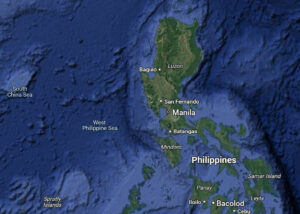By Chloe Mari A. Hufana, Reporter
TECH GIANT Google LLC’s decision to label a part of the South China Sea as the “West Philippine Sea” is a symbolic win for the Philippines in its sea dispute with China, according to a diplomacy expert.
“This move by Google further legitimizes our sole rights over the disputed [waters],” Josue Raphael J. Cortez, a diplomacy lecturer at De La Salle-College of St. Benilde in Manila, told BusinessWorld in a Facebook Messenger chat on Tuesday.
“Given that Google is a US-based entity, it is not surprising anymore that such initiatives will be undertaken in light of the fact that the Trump regime greatly supports the Philippines in its quest for exclusive rights as promulgated through a 2016 arbitral ruling,” he added.
The Philippines refers to areas of the South China Sea within its exclusive economic zone as the West Philippine Sea.
Google’s cartographic update, however, could exacerbate tensions between the US and China, he said. But since Google is banned in Mainland China, the move is unlikely to trigger additional restrictions there.
“With the imposition of nuanced reciprocal tariffs, countries in the region would not dare to do bold moves against US-based companies as this can be viewed by the Trump administration as a challenge to their interests,” Mr. Cortez said.
The US has imposed 145% tariffs on Chinese exports as part of its “America-First Policy.” Beijing retaliated with 125% tariffs against Washington. Reciprocal tariffs on the rest of the world including Southeast Asian countries have been put on hold for 90 days.
Given the shift in global media consumption patterns, where social media and digital platforms eclipse traditional outlets, Google’s changes could significantly influence public perception, the academic said.
“In our region alone, most Southeast Asians utilize social media to receive information about timely and relevant issues,” he said. “In the case of Google, it can be deduced that this is, in a way, in line with America’s current foreign policy on the Indo-Pacific.”
One of the most notable developments in recent months was the Gulf of Mexico/America naming controversy, where Google and other mapping platforms, replaced the traditional “Gulf of Mexico” label with “Gulf of America” for users accessing the service within the US.
For users outside Mexico and the US, the platform displays both names, with one appearing in parentheses to reflect differing national perspectives.
In 2009, the tech giant acknowledged its Maps platform adapts based on local context, noting that it wanted to reflect on-the-ground realities in the region it serves.
The West Philippine Sea, an area rich in marine resources and vital shipping lanes, has long been a flashpoint in Asia-Pacific geopolitics. The Philippines, China, Vietnam, Malaysia, Brunei, and Taiwan all claim parts of the sea.
Despite a legal victory for Manila in 2016, Beijing continues to assert sovereignty in the area through its “nine-dash-line” map.
In 2012, the late President Benigno S.C. Aquino III issued an order renaming the areas of the South China Sea within the western part of the Philippines’ exclusive economic zone as the West Philippine Sea to strengthen Manila’s sovereign rights.
Speaker Ferdinand Martin G. Romualdez said the Google move should prompt other mapping services, cartographic institutions and nations to acknowledge the Philippines’ claim in the South China Sea.
“Google’s decision to reflect the West Philippine Sea label is more than a map update,” he said in a statement. “It’s a geopolitical affirmation. This platform shapes global consciousness, and this recognition adds significant weight to our cause.”
“We hope this move will encourage other mapping services, institutions, and governments to follow suit and acknowledge what the law and justice clearly uphold,” he added. — with Kenneth Christiane L. Basilio
